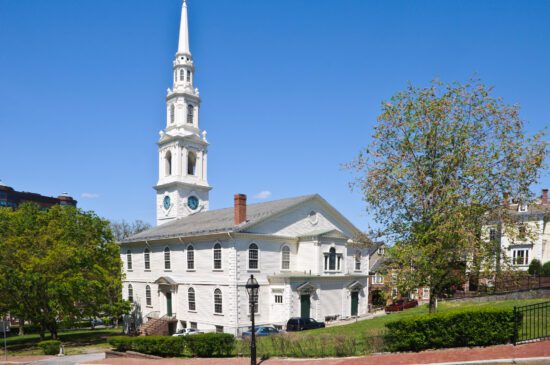Editor’s Note: Canon & Culture is beginning 2015 with a Symposium on Statecraft and political theology featuring six essays from Research Fellows of the ERLC’s Research Institute.
Since World War II, the Supreme Court has performed a stunning reduction to absurdity on a misreading of the First Amendment, particularly the Establishment Clause. What was intended originally to block the establishment of a national church, such as you have in the UK and Denmark, has been turned into a witch hunt against any official manifestation of special respect for the Judeo-Christian perspective.
Unfortunately, until 1990, the SBC was party to much of this through its alliance with the ecumenical Baptist Joint Committee on Public Affairs, and, by extension, Americans United for the Separation of Church and State, hand in glove with the ACLU on these matters. By breaking ties with the BJCPA and bolstering the program of the Christian Life Commission, now the Ethics and Religious Liberty Commission, the SBC manifested the change early on with its amicus brief supporting the right of a Rhode Island middle school to invite a rabbi pray at graduation exercises (Lee v. Weisman, 1992).
While every US president has made respectful reference to God in at least one inaugural address; while presidents James Monroe and John Quincy Adam endorsed before Congress Christian missions to the Indians; while Franklin Roosevelt wrote an admiring foreword to the WWII-era New Testament published by the Government Printing Office, we now count as received wisdom Justice Fortas’s claim in Epperson v. Arkansas (1968), that the “First Amendment mandates governmental neutrality between religion and religion, and between religion and nonreligion.”
What then is foundational to our national framework if not recognition of “our Creator,” as Jefferson put it in the Declaration of Independence? With what shall we order ourselves if we dismiss Justice Douglas’s statement in Zorach v. Clauson (1952): “We are a religious people whose institutions presuppose a Supreme Being.”
I submit that we’ve crowned feelings, and thereby have enthroned a new right, the right to not be offended, to not feel marginalized or stigmatized – that is, unless you cling to your insistence that Judeo-Christian perspectives are worthy of special respect. Thus, by the Court’s machinations, we’re become a nation without metaphysics, but only therapeutics. I call it “therapeutic nihilism,” to which the following cases have contributed.
Regarding Psychological Harm to the Children
In School District of Abington Township v. Schempp (1963), the Supreme Court worried with Roger Schempp that his kids would come off as “odd balls” if they refused to listen to the daily Bible reading, with a state court that they would suffer a “religious stigma,” and with a rabbi, that they could suffer psychological harm “if portions of the New Testament were read without explanation.”
But where does the court trouble itself over the feelings of young-earth-creationist kids who are told their convictions are hogwash in Kitzmiller v. Dover (2005)? What if a student at B. Bernice Young Elementary School in Burlington Township, New Jersey, had refused, post-2008-election, to sing “Mmm, Mmm, Mmm! Barack Hussein Obama”? What about the obese kids who feel stigmatized by the first lady’s dietetic crusade? The peace-church kids who ask to be excused from a reading of Ralph Waldo Emerson’s Concord Hymn (“By the rude bridge that arched the flood,Their flag to April’s breeze unfurled, Here once the embattled farmers stood, And fired the shot heard round the world.”)? The Hindu kid who shows up with a red dot on her forehead? The benighted youth who keeps his seat when the assembly speaker delivers some gaseous falsehood generating a standing ovation? How about their “stigmatization”? Not a word from the Court.
Regarding Nefarious Motives and Aspirations
In Romer v. Evans (1996), Justice Kennedy said, regarding the Colorado law against gay behavior, “Its sheer breadth is so discontinuous with the reasons offered for it that the amendment seems inexplicable by anything but animus toward the class that it affects…” He picked up on the same notion to knock down the Defense of Marriage Act in U.S. v. Windsor (2013).
So do the courts reject noble-sounding free press cases when they decide the defendant really just wants to keep publishing disgusting material to corrupt the youth of the land? Do they chase immigration lawyers out of court when they determine that, down deep, they only care about bolstering the voting base of a political party? Where does this sort of divining end?
Regarding the Outsider Complex
In County of Allegheny v. ACLU Greater Pittsburgh Chapter (1989), a dissenting Justice O’Connor said that allowing a crèche and menorah on courthouse grounds “sends a message to nonadherents that they are outsiders, not full members of the political community . . .”
But when I pastored in Evanston, Illinois, the Chicago suburb with the most gay households, and preached the clear message of Romans 1, I never sensed that the courts had my back if this cost me standing in the community or hurt my political prospects should I choose to run for office. In a city which tossed the Boy Scouts out of the United Way for its reluctance to appoint homosexual scoutmasters, I had no reason to think I’d be appreciated for my beliefs or invited to tony parties, but it never occurred to me to get a lawyer to remedy that.
The Liberty of Stigmatizing Stigmatizers
What we’ve forgotten is that we are properly a land of stigmatizing stigmatizers. It used to be said that my freedom to extend my arm ended at your nose. Now it seems that my freedom to criticize your behavior ends at your feelings. We’ve substituted speech codes for physical behavior codes and introduced hate crimes to augment real crimes. We’re beginning to lose the rough and tumble of argument which keeps free societies free. Ours had been a nation where I may excoriate pederasty and be excoriated for my “puritanical” perspective; where I may vilify military appeasement and, in turn, be vilified for my warmongering; where I may call the governor an adulterer and he may call me a meddling zealot.
Judicial Pushback
Justice Scalia deserves special praise for pushing back against therapeutic nihilism: Rebuking the majority opinion in Romer v. Evans, he shot back, “The Court has mistaken a Kulturkampf [“culture struggle”] for a fit of spite.” In his dissent from Edwards v. Aguillard(1987), he wrote, regarding a balanced-treatment rule regarding evolution, “The questions of its constitutionality cannot rightly be disposed of on the gallop, by impugning the motives of its supporters.” In his dissent from the Weisman decision, with its talk of psychological coercion, Scalia wrote, sarcastically, “Perhaps further intensive psychological research remains to be done on these matters.”
The Chimera of Neutrality
Michigan State’s Frank Ravitch (our SBTS church-state textbook’s editor) has written, “Like the tooth fairy, neutrality is just a myth, but like children who want the tooth fairy to visit, we want it to be real or at least for something to stand in for it to make us believe it is real.” Well, actually, neutrality is a dangerous stance, no more desirable than possible. To quote William James, belief in God is a live, forced, and momentous option for individuals, and I would suggest that it extends to governments as well.
I think of journalistic objectivity, another impossibility. While, of course, you wish the press to give fair reading to the issues, you hardly want newspapermen who think there is a moral equivalency between NAMBLA and the Red Cross, who aren’t sure if the birth of mongrel puppies under a house on Oak Street is more important than the mayor’s embezzling a million dollars. You have to be coming from somewhere. Similarly, states are coming from or going toward somewhere. And, in that connection, it is critical where those starting points and destinations might be.
Pre-emptive Disestablishment
We hear a lot of over-heated talk about the establishment of religion when government gives slightest nod to the Judeo-Christian perspective, but I think preemptive disestablishment is more to the point. We need to take a via negativa, avoiding deference to such faiths as Hinduism, with its caste system; Islam, with its sharia-driven dhimmitude; Animism, with its indifference to science, its worship of nature and overweening superstition; Buddhism, with its irrationality and self-absorption; Atheism, where humanity arbitrarily definable and morally unaccountable; Shintoism, with its ancestor worship; Cults, with their sexual adventurism; Utopianism, with its love of tyranny; Scientism, which spawned eugenics; Rationalism, which yields radically divergent conclusions depending upon the premises: “garbage in garbage out.”
Discursive Judeo-Christianism
Rather, we need a nation giving special honor to the Judeo-Christian perspective – not to establish a church, for there is no such denomination, but to recognize, following the Bible, that man is made in God’s image (Red and Yellow, Black and White . . . and, yes, developmentally disabled persons . . . All are Precious in His Sight); that man in fallen (necessitating checks and balances and term limits); that licit marriage is between one man and one woman (hence DOMA); that people are free to follow their consciences, for membership in the family of God is based not on coercion, but on belief, which cannot be coerced.
On this model, we would continue to have White House and Capitol Christmas tree lightings (where, this year, the speaker honored “Christ” by name) – and not White House animal sacrifices at the behest of Muslims, Samhain festivities for the Wiccans, a Vesak ceremony to honor Buddha’s birth, or drumming and dancing for fellowship with Santerian Orishas. (Of course, we should be ready to celebrate the contributions of individual American Muslims and Hindus, but this is not to celebrate Islam and Buddhism per se.)
It means that we will print Christmas and Hannukah stamps but not Eid stamps. For one thing, it recognizes our history, for if Wahabis or Brahmans, if Shamans or Imams, had landed on Plymouth Rock, we would have a very different, indeed unrecognizable, nation.
This position is “discursive” since it honors reason, a creation order, and natural law. It continuously hears from everybody, for it is fearful of blind spots and of parading about in “emperor’s new clothes.” It works with the conviction that lost and saved alike have access to conscience (Romans 2:14-15), observation, and logic. For those who count religion irrational, I would point them to the virtual festival of fallacies displayed by the “anti-establishment” extremists – from ad hominem (“animus”) to ad misericordiam (the “outsider” feeling), to false dichotomy (“neutrality or tyranny”), to slippery slope (school prayer leading to pogroms).
Winsome Not So Old World, Circa 1950
What sort of ruinous theocracy am I suggesting? Basically, the sort of America we had around 1950. Before Lyndon Johnson finessed a pulpit-binding rider to an IRS bill, one limiting political speech. Before it was illegal for the Gideons to distribute Bibles to school kids. And in the day when Pastor George Truett, a champion of religious liberty, could still deliver a baccalaureate address at Texas A&M.
But what of Muslims in Montgomery Country Maryland who pressed for a school Eid holiday along with Christmas and Rosh Hashannah? How can they endure such discriminatory policy? How can they find peace in a land which shows so little regard for their religion? For them, liberty is not enough; they desire parity.
I think it is good to remind them that many of them have come from lands where Christians were denied full religious liberty, much less parity, and that they did not distinguish themselves by objecting to these policies. But it is also good to point out that people from all faiths and climes have flocked to this “insensitive” land, discovering that there is no safer place on earth for religious minorities than an American town where a local preacher prays “in Jesus’ name” from the press box at the Friday night football game.
The view expressed in this commentary belongs solely to the author and is not necessarily the view of the ERLC.










